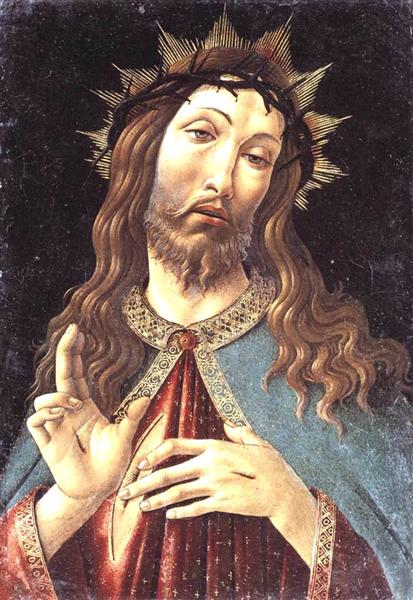Beschreibung
Sandro Botticelli's Christ Crowned with Thorns, painted around 1500, stands as a leading exponent of Renaissance art. Capturing an emotionally charged moment, this painting reflects both Botticelli's technical mastery and his profound exploration of spiritual and moral themes. Through its composition, its use of color, and its depiction of the central figure, the work invites contemplative reflection on suffering and redemption.
At the centre of the work we find Christ, whose figure is of an intense and at the same time delicate corporeality. The expression on his face is a mixture of pain and serenity, manifesting the duality of his sacrifice. This treatment of the human figure is characteristic of Botticelli, who gives his characters an idealised beauty, which contrasts with the suffering they experience. The use of gold in the crown of thorns and the luminous hue of the background illuminate the scene, suggesting the divinity of the protagonist even at the moment of his greatest affliction. The choice of a colour palette that transitions from earthy tones to bright golden hues achieves an evocative effect, suggesting a connection between the earthly and the heavenly.
The visual tension in the painting is built up by the arrangement of the elements. The figure of Christ is centred, dominating the space, while the crown of thorns accentuates his suffering. Botticelli, skilled in the use of line and form, creates a balanced image, where the outline of the figure blends harmoniously with the background. The contrast between Christ's face and the crown that surrounds him amplifies the tragedy of the scene, in a play between light and darkness that resonates throughout the history of Christian art.
A deeply interesting aspect of “Christ Crowned with Thorns” is its alignment with the devotional piety practices of the late 15th and early 16th centuries. During this time, Italian artists began to incorporate more emotive and psychological elements into their art, allowing audiences to connect more intimately with the figure of Christ. Botticelli, a contemporary of other great masters such as Leonardo da Vinci and Michelangelo, shares with them an exploration of human emotional portraiture, though his style is unmistakably distinct, marked by an almost ethereal elegance.
Despite its outstanding mastery, the work is set in a transitional period in Botticelli's career. Having achieved great acclaim thanks to works such as The Birth of Venus and Primavera, Christ Crowned with Thorns suggests a return to religious iconography at a time when his career was beginning to descend into relative oblivion. The work fits into a broader context of Renaissance religious painting, where artists such as Fra Angelico and Giovanni Bellini also explored the suffering of Christ with similar depth, although each with his own particular approach.
In conclusion, Sandro Botticelli's "Christ Crowned with Thorns" is not only a striking depiction of Christ's suffering, but also a testament to the artist's virtuosity and sensitivity. Through his attention to form, emotional expression, and color contrasts, Botticelli delivers a work that resonates both spiritually and aesthetically, inviting the viewer into a meditation on humanity and the divine. This masterpiece remains a magnet for those seeking to understand the lasting legacy of the Italian Renaissance and the emotional depth that art can convey.
KUADROS ©, a famous painting on your wall.
Hand-made oil painting reproductions, with the quality of professional artists and the distinctive seal of KUADROS ©.
Painting reproduction service with satisfaction guarantee. If you are not completely satisfied with the replica of your painting, we will refund 100% of your money.

